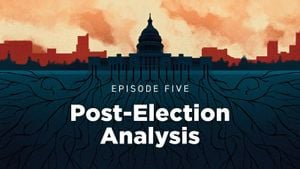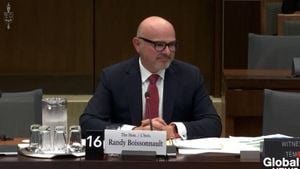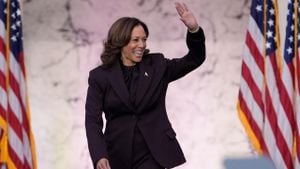With Donald Trump having made the decidedly bold decision to nominate Lee Zeldin as the next head of the Environmental Protection Agency (EPA), reactions have been swift and varied across the spectrum of environmental and industry sectors. Zeldin, who previously served as a U.S. Representative for New York, has drawn attention for his controversial voting record on environmental issues, leaving many to wonder what direction he will take the EPA amid pressing climate challenges.
When Trump announced Zeldin's nomination, it came just days after the election, signaling what could be seen as an organized and urgent move to establish his agenda at the EPA. This contrasts starkly with the approach of previous administrations, where nominee announcements came much later; for example, President Biden waited until December to announce his picks, indicating a more deliberative process.
Industry advocates are cautiously optimistic about Zeldin's approach. They hope he will work collaboratively on significant issues pertaining to waste, recycling, and the packaging industry. Many stakeholders are eager for Zeldin to prioritize streamlined approval processes, particularly concerning carbon capture and storage projects. These have faced significant bottlenecks at the EPA, hampering efforts to meet climate goals outlined under the Inflation Reduction Act (IRA).
While there is bipartisan frustration around the lagging permitting processes, Zeldin’s ability to manage these will be pivotal. Already, over 150 applications for carbon capture injection wells are pending, with many waiting for years due to bureaucratic red tape. The potential for private investment is enormous, not only for the financial sector but also for advancing America’s energy goals.
Significantly, only three states have achieved the authority to oversee their own carbon capture projects, reflecting the limited progress under current EPA regulations. Zeldin, upon his confirmation, is expected to focus on granting more states similar primacy and expediting the review processes.
Environmental activists, on the other hand, have voiced their concerns. Zeldin has consistently voted against comprehensive climate legislation and played little role during his time in Congress to advance environmental policy. For example, the League of Conservation Voters awarded him just 14% on their scorecard for pro-environment votes, raising alarms about the future of ecological protections under his leadership.
Zeldin was one of the few Republicans who previously supported establishing drinking water standards for toxic chemicals known as PFAS, which are linked to severe health risks. This move could indicate his willingness to engage on some environmental issues, but many fear he might align more closely with Trump's broader deregulatory agendas, which often focus more on economic growth at the expense of environmental protections.
Looking back on Zeldin's previous statements, he has indicated intentions to put energy production at the forefront, claiming, "We have the ability to pursue energy dominance." This perspective resonates with the Republican strategy of prioritizing fossil fuel advantages rather than investing heavily in renewable energies or innovative sustainability solutions.
Further complicity is seen within the industry itself, where many agencies and companies await Zeldin’s stance on various initiatives, including electric vehicle production and funding opportunities for biogas projects. Zeldin's prior commitments hint at potential rollbacks of Biden's policies, which invested deeply in those sectors.
On the political chessboard, Zeldin's appointment signifies more than just another bureaucratic shake-up; it could mean the erosion of hard-won gains from the past few years for environmental advocates. There’s fear of regression especially for communities already struggling with pollution from fossil fuel sites—areas referred to as "sacrifice zones" where harmful emissions disproportionately affect local populations.
Industry executives and advocacy groups agree it is imperative they quickly familiarize Zeldin with top priorities, particularly those surrounding waste management and resource recovery. Leaders from the waste management sector believe it’s their mission to convey the advanced technologies and initiatives they have developed, as they pursue goals of optimizing recycling processes and investing heavily to reduce landfill waste.
A powerful convergence of these interests, especially those near the coal and natural gas industries, is expected to shape regulatory practices under Zeldin's leadership. Industry groups are already gearing up to present their agendas clearly to Zeldin, hoping he will become their advocate when tackling challenges with federal permits and compliance costs.
The National Caucus of Environmental Legislators has remained neutral following Zeldin's nomination, indicating their watchful approach as the confirmation process stalls. The caucus emphasizes a desire for sustainable practices and hopes to maintain legislative pressure regardless of the legislative body's composition.
Overall, Zeldin's nomination raises eyebrows, not only because of his stark background but because it may herald significant shifts at the EPA. Confirmation by the Senate—leaning Republican after the recent elections—could signal reduced oversight and increased benefits for industry-heavy operations, potentially sidelining efforts to uphold environmental justice across the nation.
Organizations like Beyond Plastics have openly expressed skepticism about the capability of the forthcoming EPA to uphold its mission of safeguarding public health and the environment under Zeldin’s guidance, reflecting the widespread concern among environmentalists.
Moving forward, how Zeldin navigates the complex web of environmental policy, public health, and industrial influence will be closely watched. Stakeholders and advocates on both sides are gearing up for the challenges and opportunities laid before them as the new administration settles its priorities and policies.



